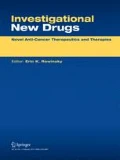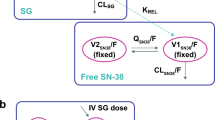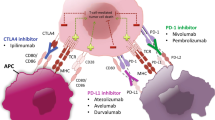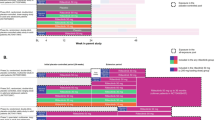Summary
Background: Type 1 insulin-like growth factor receptor (IGF-IR) signaling is often dysregulated in cancer. Cixutumumab, a fully human IgG1 monoclonal antibody, blocks IGF-IR and inhibits downstream signaling. The current study determined the recommended dose, safety, and pharmacokinetic (PK) profile of weekly or every-2-week dosing of cixutumumab. Patients and Methods: Two open-label, multicenter phase I studies evaluated weekly (3–15 mg/kg) or every-2-weeks (6–15 mg/kg) dosing of cixutumumab in patients with advanced solid tumors. Serial blood samples for PK were collected up to 168–336 h (day 8–15) following the first administration of cixutumumab. Efficacy was evaluated as best overall tumor response. Results: A total of 24 and 16 patients were enrolled in the weekly and every-2-week dosing studies, respectively. Treatment-emergent adverse events (≥10 %) included hyperglycemia, fatigue, anemia, nausea, and vomiting. Severe adverse events (AE) were infrequent; one serious AE (grade 3 electrocardiogram QT prolongation) was deemed possibly cixutumumab-related (10 mg/kg every-2-weeks). One death occurred due to disease progression (6 mg/kg weekly cohort). Maximum serum concentrations increased with dose. A maximum tolerated dose was not identified; pre-determined target serum minimum concentrations (60 μg/mL) were achieved with ≥6 mg/kg weekly and ≥10 mg/kg every-2-week dosing. Cixutumumab terminal elimination half-life is approximately a week (individual range, t1/2 = 4.58–9.33 days based upon 10 mg/kg every 2 weeks). Overall, stable disease was achieved in 25 % of all patients. Conclusions: Cixutumumab was associated with favorable safety and PK profiles. A dosing regimen of 10 mg/kg every 2 weeks was recommended for subsequent disease-focused clinical trials.


Similar content being viewed by others
References
Moschos SJ, Mantzoros CS (2002) The role of the IGF system in cancer: from basic to clinical studies and clinical applications. Oncology 63:317–332
Pollak MN, Schernhammer ES, Hankinson SE (2004) Insulin-like growth factors and neoplasia. Nat Rev Cancer 4:505–518
Wang Y, Sun Y (2002) Insulin-like growth factor receptor-1 as an anti-cancer target: blocking transformation and inducing apoptosis. Curr Cancer Drug Targets 2:191–207
Gooch JL, Van Den Berg CL, Yee D (1999) Insulin-like growth factor (IGF)-I rescues breast cancer cells from chemotherapy-induced cell death–proliferative and anti-apoptotic effects. Breast Cancer Res Treat 56:1–10
Turner BC, Haffty BG, Narayanan L, Yuan J, Havre PA, Gumbs AA, Kaplan L, Burgaud JL, Carter D, Baserga R, Glazer PM (1997) Insulin-like growth factor-I receptor overexpression mediates cellular radioresistance and local breast cancer recurrence after lumpectomy and radiation. Cancer Res 57:3079–3083
Yu D, Watanabe H, Shibuya H, Miura M (2003) Redundancy of radioresistant signaling pathways originating from insulin-like growth factor I receptor. J Biol Chem 278:6702–6709
Dunn SE, Hardman RA, Kari FW, Barrett JC (1997) Insulin-like growth factor 1 (IGF-1) alters drug sensitivity of HBL100 human breast cancer cells by inhibition of apoptosis induced by diverse anticancer drugs. Cancer Res 57:2687–2693
Lu Y, Zi X, Zhao Y, Mascarenhas D, Pollak M (2001) Insulin-like growth factor-I receptor signaling and resistance to trastuzumab (Herceptin). J Natl Cancer Inst 93:1852–1857
Allen GW, Saba C, Armstrong EA, Huang SM, Benavente S, Ludwig DL, Hicklin DJ, Harari PM (2007) Insulin-like growth factor-I receptor signaling blockade combined with radiation. Cancer Res 67:1155–1162
Houghton PJ, Morton CL, Gorlick R, Kolb EA, Keir ST, Reynolds CP, Kang MH, Maris JM, Wu J, Smith MA (2010) Initial testing of a monoclonal antibody (IMC-A12) against IGF-1R by the Pediatric Preclinical Testing Program. Pediatr Blood Cancer 54:921–926
Therasse P, Arbuck SG, Eisenhauer EA, Wanders J, Kaplan RS, Rubinstein L, Verweij J, Van GM, van Oosterom AT, Christian MC, Gwyther SG (2000) New guidelines to evaluate the response to treatment in solid tumors. European Organization for Research and Treatment of Cancer, National Cancer Institute of the United States, National Cancer Institute of Canada. J Natl Cancer Inst 92:205–216
Ma CX, Suman VJ, Goetz M, Haluska P, Moynihan T, Nanda R, Olopade O, Pluard T, Guo Z, Chen HX, Erlichman C, Ellis MJ, Fleming GF (2013) A phase I trial of the IGF-1R antibody cixutumumab in combination with temsirolimus in patients with metastatic breast cancer. Breast Cancer Res Treat 139:145–153
Schoffski P, Adkins D, Blay JY, Gil T, Elias AD, Rutkowski P, Pennock GK, Youssoufian H, Gelderblom H, Willey R, Grebennik DO (2013) An open-label, phase 2 study evaluating the efficacy and safety of the anti-IGF-1R antibody cixutumumab in patients with previously treated advanced or metastatic soft-tissue sarcoma or Ewing family of tumours. Eur J Cancer 49:3219–3228
Chi KN, Gleave ME, Fazli L, Goldenberg SL, So A, Kollmannsberger C, Murray N, Tinker A, Pollak M (2012) A phase II pharmacodynamic study of preoperative figitumumab in patients with localized prostate cancer. Clin Cancer Res 18:3407–3413
Schwartz GK, Tap WD, Qin LX, Livingston MB, Undevia SD, Chmielowski B, Agulnik M, Schuetze SM, Reed DR, Okuno SH, Ludwig JA, Keedy V, Rietschel P, Kraft AS, Adkins D, Van Tine BA, Brockstein B, Yim V, Bitas C, Abdullah A, Antonescu CR, Condy M, Dickson MA, Vasudeva SD, Ho AL, Doyle LA, Chen HX, Maki RG (2013) Cixutumumab and temsirolimus for patients with bone and soft-tissue sarcoma: a multicentre, open-label, phase 2 trial. Lancet Oncol 14:371–382
Fujisaka Y, Yamada Y, Yamamoto N, Horiike A, Tamura T (2010) A Phase 1 clinical study of temsirolimus (CCI-779) in Japanese patients with advanced solid tumors. Jpn J Clin Oncol 40:732–738
Guo J, Huang Y, Zhang X, Zhou F, Sun Y, Qin S, Ye Z, Wang H, Jappe A, Straub P, Pirotta N, Gogov S (2013) Safety and efficacy of everolimus in Chinese patients with metastatic renal cell carcinoma resistant to vascular endothelial growth factor receptor-tyrosine kinase inhibitor therapy: an open-label phase 1b study. BMC Cancer 13:136
Wolpin BM, Hezel AF, Abrams T, Blaszkowsky LS, Meyerhardt JA, Chan JA, Enzinger PC, Allen B, Clark JW, Ryan DP, Fuchs CS (2009) Oral mTOR inhibitor everolimus in patients with gemcitabine-refractory metastatic pancreatic cancer. J Clin Oncol 27:193–198
Cohen EE, Wu K, Hartford C, Kocherginsky M, Eaton KN, Zha Y, Nallari A, Maitland ML, Fox-Kay K, Moshier K, House L, Ramirez J, Undevia SD, Fleming GF, Gajewski TF, Ratain MJ (2012) Phase I studies of sirolimus alone or in combination with pharmacokinetic modulators in advanced cancer patients. Clin Cancer Res 18:4785–4793
Hudis C, Swanton C, Janjigian YY, Lee R, Sutherland S, Lehman R, Chandarlapaty S, Hamilton N, Gajria D, Knowles J, Shah J, Shannon K, Tetteh E, Sullivan DM, Moreno C, Yan L, Han HS (2013) A phase 1 study evaluating the combination of an allosteric AKT inhibitor (MK-2206) and trastuzumab in patients with HER2-positive solid tumors. Breast Cancer Res 15:R110. doi:10.1186/bcr3577
Molife LR, Yan L, Vitfell-Rasmussen J, Zernhelt AM, Sullivan DM, Cassier PA, Chen E, Biondo A, Tetteh E, Siu LL, Patnaik A, Papadopoulos KP, de Bono JS, Tolcher AW, Minton S (2014) Phase 1 trial of the oral AKT inhibitor MK-2206 plus carboplatin/paclitaxel, docetaxel, or erlotinib in patients with advanced solid tumors. J Hematol Oncol 7:1. doi:10.1186/1756-8722-7-1
Wuthrick EJ, Kamrava M, Curran WJ Jr, Werner-Wasik M, Camphausen KA, Hyslop T, Axelrod R, Andrews DW, Glass J, Machtay M, Dicker AP (2011) A phase 1b trial of the combination of the antiangiogenic agent sunitinib and radiation therapy for patients with primary and metastatic central nervous system malignancies. Cancer 117:5548–5559
Ma H, Zhang T, Shen H, Cao H, Du J (2013) The adverse events profile of anti-IGF-1R monoclonal antibodies in cancer therapy. Br J Clin Pharmacol 77:917–928
Gajdos C, Tartter PI, Estabrook A, Gistrak MA, Jaffer S, Bleiweiss IJ (2002) Relationship of clinical and pathologic response to neoadjuvant chemotherapy and outcome of locally advanced breast cancer. J Surg Oncol 80:4–11
Orditura M, Galizia G, Morgillo F, Martinelli E, Lieto E, Vitiello F, Di Martino N, Pacelli R, Renda A, Ciardiello F, De Vita F (2012) Complete response to preoperative chemoradiation and survival in esophageal cancer: a pooled analysis of three single-institution phase II trials. Dis Esophagus 25:130–136
Van Damme V, Govaerts E, Nackaerts K, Dooms C, Wauters I, Vansteenkiste J (2013) Clinical factors predictive of long-term survival in advanced non-small cell lung cancer. Lung Cancer 79:73–76
Smith GD, Gunnell D, Holly J (2000) Cancer and insulin-like growth factor-I. A potential mechanism linking the environment with cancer risk. BMJ 321:847–848
Pollak M (2000) Insulin-like growth factor physiology and cancer risk. Eur J Cancer 36:1224–1228
Hankinson SE, Willett WC, Colditz GA, Hunter DJ, Michaud DS, Deroo B, Rosner B, Speizer FE, Pollak M (1998) Circulating concentrations of insulin-like growth factor-I and risk of breast cancer. Lancet 351:1393–1396
Yu H, Rohan T (2000) Role of the insulin-like growth factor family in cancer development and progression. J Natl Cancer Inst 92:1472–1489
Pollak M (2001) Insulin-like growth factors and prostate cancer. Epidemiol Rev 23:59–66
Khandwala HM, McCutcheon IE, Flyvbjerg A, Friend KE (2000) The effects of insulin-like growth factors on tumorigenesis and neoplastic growth. Endocr Rev 21:215–244
Nickerson T, Chang F, Lorimer D, Smeekens SP, Sawyers CL, Pollak M (2001) In vivo progression of LAPC-9 and LNCaP prostate cancer models to androgen independence is associated with increased expression of insulin-like growth factor I (IGF-I) and IGF-I receptor (IGF-IR). Cancer Res 61:6276–6280
Wu J, Zhu AX (2011) Targeting insulin-like growth factor axis in hepatocellular carcinoma. J Hematol Oncol 4:30. doi:10.1186/1756-8722-4-30
Juergens H, Daw NC, Geoerger B, Ferrari S, Villarroel M, Aerts I, Whelan J, Dirksen U, Hixon ML, Yin D, Wang T, Green S, Paccagnella L, Gualberto A (2011) Preliminary efficacy of the anti-insulin-like growth factor type 1 receptor antibody figitumumab in patients with refractory Ewing sarcoma. J Clin Oncol 29:4534–4540
Pappo AS, Patel SR, Crowley J, Reinke DK, Kuenkele KP, Chawla SP, Toner GC, Maki RG, Meyers PA, Chugh R, Ganjoo KN, Schuetze SM, Juergens H, Leahy MG, Geoerger B, Benjamin RS, Helman LJ, Baker LH (2011) R1507, a monoclonal antibody to the insulin-like growth factor 1 receptor, in patients with recurrent or refractory Ewing sarcoma family of tumors: results of a phase II Sarcoma Alliance for Research Through Collaboration study. J Clin Oncol 29:4541–4547
Shin DH, Min HY, El-Naggar AK, Lippman SM, Glisson B, Lee HY (2011) Akt/mTOR counteract the antitumor activities of cixutumumab, an anti-insulin-like growth factor I receptor monoclonal antibody. Mol Cancer Ther 10:2437–2448
Naing A, LoRusso P, Fu S, Hong DS, Anderson P, Benjamin RS, Ludwig J, Chen HX, Doyle LA, Kurzrock R (2012) Insulin growth factor-receptor (IGF-1R) antibody cixutumumab combined with the mTOR inhibitor temsirolimus in patients with refractory Ewing’s sarcoma family tumors. Clin Cancer Res 18:2625–2631
Di Cosimo S, Bendell JC, Cervantes-Ruiperez A, Roda D, Prudkin L, Stein MN, Leighton-Swayze Y, Song S, Ebbinghaus S, Baselga J (2010) A phase I study of the oral mTOR inhibitor ridaforolimus (RIDA) in combination with the IGF-1R antibody dalotozumab (DALO) in patients (pts) with advanced solid tumors (Abstract). J Clin Oncol 28 (15s); Abstr 3008
Acknowledgments
The authors would like to acknowledge Chastity Bradley, PhD, Medical Communication Consultants, for medical writing assistance and Lisa R Ferguson-Sells, Eli Lilly and Company, for her critical review of the manuscript.
Funding
This work (CP13-0501 [NCT00785538] and CP13-0502 [NCT00785941]) was supported by Eli Lilly and Company, Bridgewater, NJ.
Conflict of interest statement
C.S. Higano and J. Berlin have conducted research sponsored by the company. S. Tang, A. Dontabhaktuni, J.D. Schwartz, and J. Cosaert are or were employees of Eli Lilly and Company and own Eli Lilly and Company stock. All remaining authors have declared no conflicts of interest.
Author information
Authors and Affiliations
Corresponding author
Additional information
Key message
These open-label, phase I studies evaluated the safety, tolerability, and pharmacokinetic profile of cixutumumab dosed weekly and every 2 weeks in patients with advanced solid tumors. Cixutumumab therapy was safe, tolerable, and demonstrated evidence of disease control. The dosing regimen established here (10 mg/kg every 2 weeks) has been used in subsequent phase II disease-focused trials.
Rights and permissions
About this article
Cite this article
Higano, C.S., Berlin, J., Gordon, M. et al. Safety, tolerability, and pharmacokinetics of single and multiple doses of intravenous cixutumumab (IMC-A12), an inhibitor of the insulin-like growth factor-I receptor, administered weekly or every 2 weeks in patients with advanced solid tumors. Invest New Drugs 33, 450–462 (2015). https://doi.org/10.1007/s10637-015-0217-7
Received:
Accepted:
Published:
Issue Date:
DOI: https://doi.org/10.1007/s10637-015-0217-7




